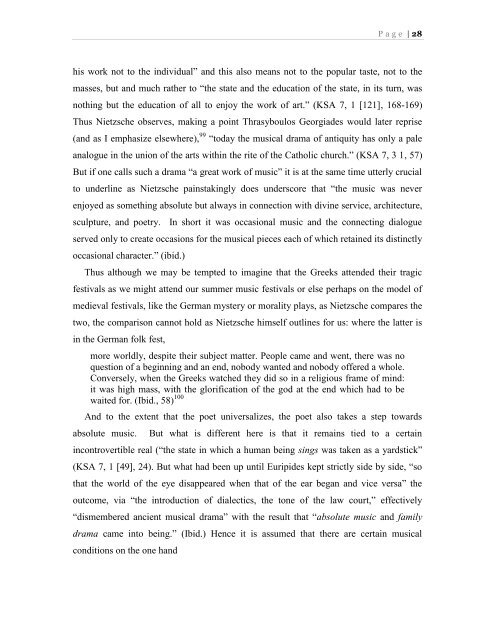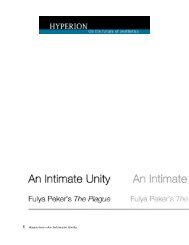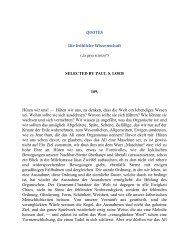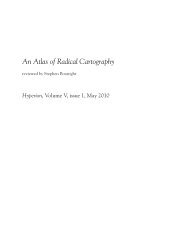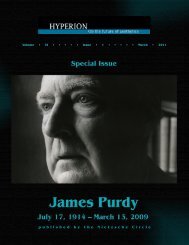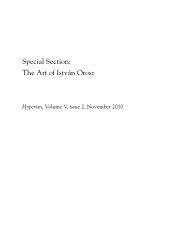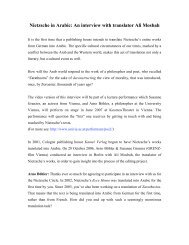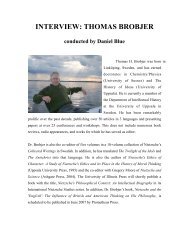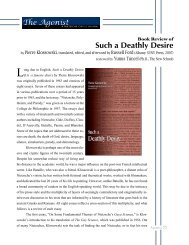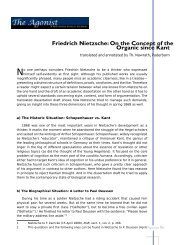Music, The Birth of Tragedy, and Nietzche's ... - Nietzsche Circle
Music, The Birth of Tragedy, and Nietzche's ... - Nietzsche Circle
Music, The Birth of Tragedy, and Nietzche's ... - Nietzsche Circle
You also want an ePaper? Increase the reach of your titles
YUMPU automatically turns print PDFs into web optimized ePapers that Google loves.
P a g e | 28<br />
his work not to the individual” <strong>and</strong> this also means not to the popular taste, not to the<br />
masses, but <strong>and</strong> much rather to “the state <strong>and</strong> the education <strong>of</strong> the state, in its turn, was<br />
nothing but the education <strong>of</strong> all to enjoy the work <strong>of</strong> art.” (KSA 7, 1 [121], 168-169)<br />
Thus <strong>Nietzsche</strong> observes, making a point Thrasyboulos Georgiades would later reprise<br />
(<strong>and</strong> as I emphasize elsewhere), 99 “today the musical drama <strong>of</strong> antiquity has only a pale<br />
analogue in the union <strong>of</strong> the arts within the rite <strong>of</strong> the Catholic church.” (KSA 7, 3 1, 57)<br />
But if one calls such a drama “a great work <strong>of</strong> music” it is at the same time utterly crucial<br />
to underline as <strong>Nietzsche</strong> painstakingly does underscore that “the music was never<br />
enjoyed as something absolute but always in connection with divine service, architecture,<br />
sculpture, <strong>and</strong> poetry. In short it was occasional music <strong>and</strong> the connecting dialogue<br />
served only to create occasions for the musical pieces each <strong>of</strong> which retained its distinctly<br />
occasional character.” (ibid.)<br />
Thus although we may be tempted to imagine that the Greeks attended their tragic<br />
festivals as we might attend our summer music festivals or else perhaps on the model <strong>of</strong><br />
medieval festivals, like the German mystery or morality plays, as <strong>Nietzsche</strong> compares the<br />
two, the comparison cannot hold as <strong>Nietzsche</strong> himself outlines for us: where the latter is<br />
in the German folk fest,<br />
more worldly, despite their subject matter. People came <strong>and</strong> went, there was no<br />
question <strong>of</strong> a beginning <strong>and</strong> an end, nobody wanted <strong>and</strong> nobody <strong>of</strong>fered a whole.<br />
Conversely, when the Greeks watched they did so in a religious frame <strong>of</strong> mind:<br />
it was high mass, with the glorification <strong>of</strong> the god at the end which had to be<br />
waited for. (Ibid., 58) 100<br />
And to the extent that the poet universalizes, the poet also takes a step towards<br />
absolute music.<br />
But what is different here is that it remains tied to a certain<br />
incontrovertible real (“the state in which a human being sings was taken as a yardstick”<br />
(KSA 7, 1 [49], 24). But what had been up until Euripides kept strictly side by side, “so<br />
that the world <strong>of</strong> the eye disappeared when that <strong>of</strong> the ear began <strong>and</strong> vice versa” the<br />
outcome, via “the introduction <strong>of</strong> dialectics, the tone <strong>of</strong> the law court,” effectively<br />
“dismembered ancient musical drama” with the result that “absolute music <strong>and</strong> family<br />
drama came into being.” (Ibid.) Hence it is assumed that there are certain musical<br />
conditions on the one h<strong>and</strong>


